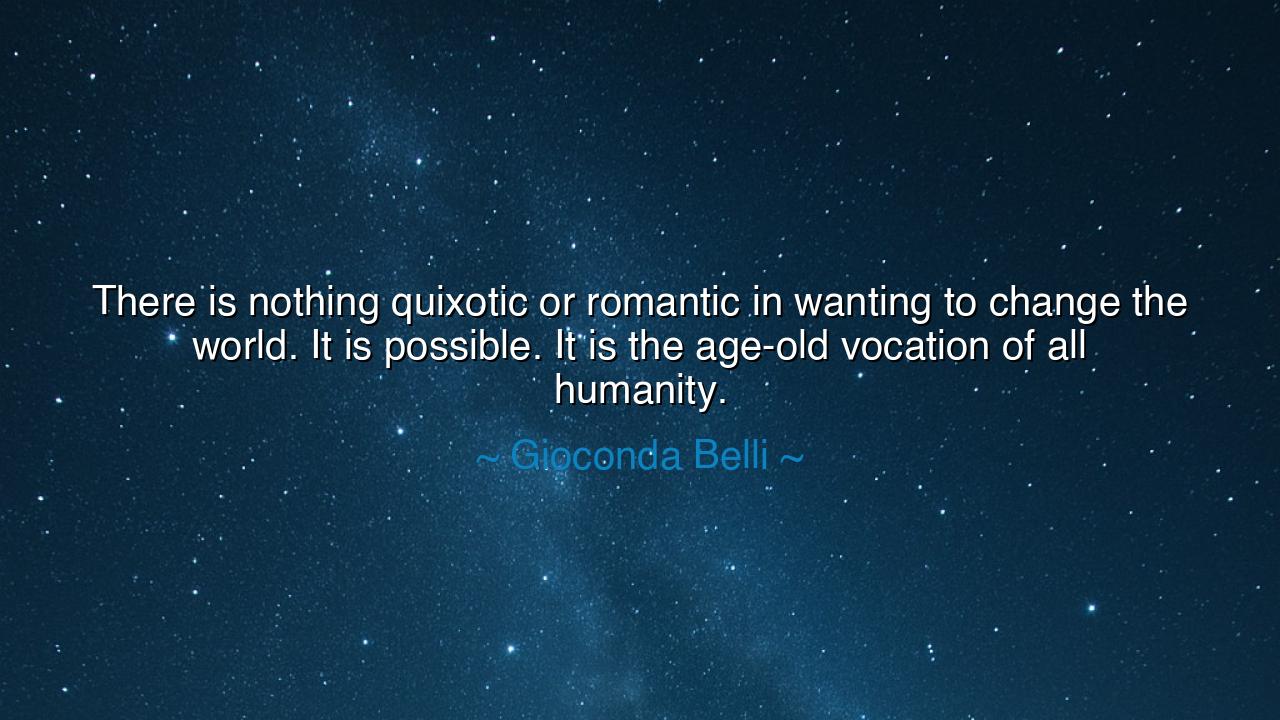
There is nothing quixotic or romantic in wanting to change the
There is nothing quixotic or romantic in wanting to change the world. It is possible. It is the age-old vocation of all humanity.






"There is nothing quixotic or romantic in wanting to change the world. It is possible. It is the age-old vocation of all humanity." These words, spoken by Gioconda Belli, are a clarion call to the hearts and minds of all those who dream of a world different from the one they inherit. In an age where many have grown disillusioned, where the quest for change is often dismissed as idealistic or unrealistic, Belli offers a bold assertion: that the drive to transform the world is not a mere fantasy but an intrinsic calling, a duty carried through the ages.
In the ancient world, the great thinkers, philosophers, and warriors alike shared a common conviction: that humanity’s purpose is to improve itself and its circumstances. Homer’s heroes embarked upon quests not for personal glory alone, but to change the fates of their people. The struggles of Achilles, Odysseus, and Hector were battles fought not only for honor but for the transformation of their world. The call to action—to change the world—is not something born of whim, but of deep-rooted understanding that the world is malleable and that individuals, united in purpose, can reshape the destiny of humanity.
Belli’s words challenge the prevailing view that striving for change is naive, a belief that arose as the world grew more complex and uncertain. However, this dismissive view stands in stark contrast to the actions of countless visionaries throughout history. Consider Gandhi, who, with the power of non-violence, led a nation to freedom. Or Martin Luther King Jr., whose dream of a world where all people are judged by the content of their character, not the color of their skin, became a movement that altered the course of a nation. These men and others did not romanticize the act of changing the world; they saw it as their duty, a vocation deeply embedded in the human spirit, passed down through generations.
What, then, is the source of such resolve? It is rooted in the very nature of humanity—the desire for betterment and justice. From the ancient Sumerians, who created the first written laws to bring order to their land, to the enlightenment thinkers like Voltaire and Rousseau, who ignited the flames of revolution in Europe, humanity has always strived to change its world for the better. It is not the romantic idealists who stand out in history, but the realists—those who understood that change requires persistence, courage, and above all, conviction.
To change the world is not an act of fantasy or folly, but of purpose. The Romans, in their rise to power, established laws, built roads, and created systems that would last for centuries. Their empire was not a fleeting dream but a realized vision, grounded in the belief that humanity, through organized effort, could create a world where order and progress thrived. In much the same way, the actions of every individual and collective effort, no matter how small, accumulate over time to shape the world. To dream of such change is not quixotic, but a practical and necessary endeavor.
As we reflect on Belli’s words, we must also examine our own role in this age-old vocation. To change the world is not reserved for the few, the famous, or the powerful. Each person, through their choices and actions, holds the potential to bring about transformation. Whether it is in how we treat others, in our stewardship of the earth, or in the way we challenge injustice, every act of change contributes to the broader shift in the world. The change is not external alone—it begins within us. Our hearts must first be changed before our actions can influence the world.
Let us then be awakened by Belli’s words, remembering that the desire to change the world is an ancient calling, not a flight of fancy. Let us take up the mantle of those who have come before us—those who believed in the power of the individual and the collective to reshape the world. We are not passive observers of fate; we are agents of change. Through deliberate action, through courage, and through the unwavering belief that we can make a difference, we answer the call of humanity’s greatest vocation.
In this, we are reminded of the lesson passed down through the ages: change is possible, and it begins with us. We must carry forward the torch of transformation, embracing the knowledge that even the smallest actions can create ripples that reach far beyond what we can see. In the grand tapestry of time, each effort to make the world more just, more compassionate, more humane, becomes a part of the legacy that future generations will inherit.






AAdministratorAdministrator
Welcome, honored guests. Please leave a comment, we will respond soon